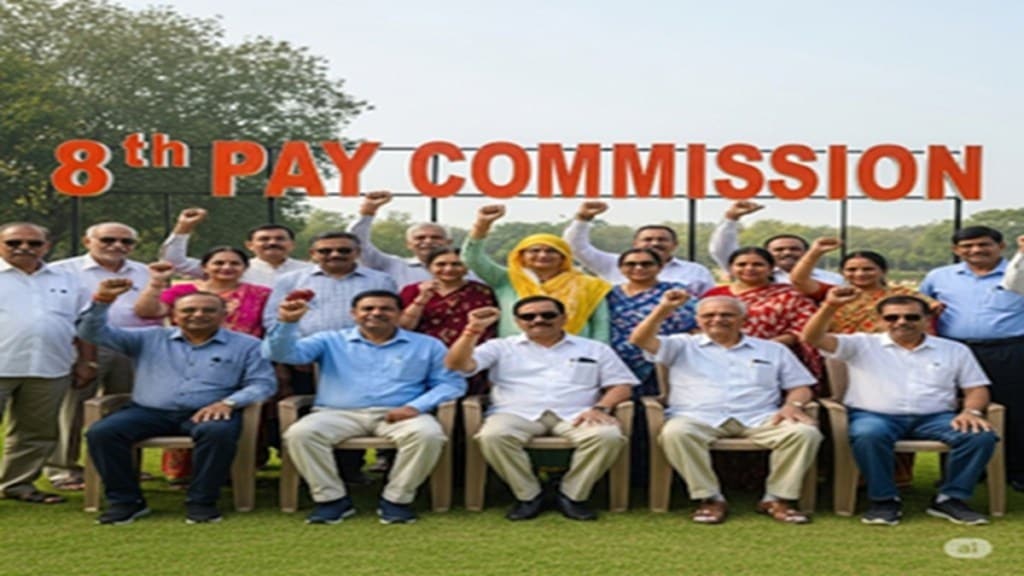8th Pay Commission News: The Centre notified the Terms of Reference (ToR) for the 8th Pay Commission on November 3, but a fresh controversy has erupted over the possible implementation date. Many employee and pensioner bodies have questioned the central government’s intention behind not mentioning the implementation date for the 8th Pay Commission recommendations.
Traditionally, every central pay commission (at least the last four panels – 4th to 7th) is constituted once in 10 years, and its recommendations also take effect after the same cycle. With the 7th CPC term ending on December 31, 2025, over one crore employees and pensioners from various central government departments assumed that the 8th CPC would automatically be implemented from January 1, 2026. Although it may take nearly two more years for recommendations to be finalised, previous pay panels have always been made effective retrospectively from the scheduled date — which, in this case, is January 1, 2026. The absence of this date in the new Terms of Reference (ToR) has therefore triggered fresh concerns.
Following the release of the 8th Central Pay Commission’s ToR, major employee representative bodies like the All India Defence Employees Federation (AIDEF), Confederation of Central Government Employees & Workers (CCGEW) and Bharat Pensioners’ Samaj (BPS) have written to Prime Minister Narendra Modi and Finance Minister Nirmala Sitharaman to complain about alleged inconsistencies in the recently notified ToR for the 8th pay panel.
The Bharat Pensioners Samaj, an organisation representing millions of pensioners across the country, has written a detailed letter to the government demanding several key changes. The organisation states that the current ToR does not include important issues related to pensioners, which should be included immediately.
In this letter, sent to the PM and the FM on November 17, 2025, the BPS clearly states that certain parts of the ToR are against the interests of pensioners, specifically, the term “unfunded cost of non-contributory pension schemes” should be removed, as it portrays pensions as a burden.
What are the demands made by the BPS?
- The recommendations of the 8th CPC should be implemented from January 1, 2026.
The BPS stated that, like every pay commission, the recommendations of the 8th CPC should be implemented from January 1, 2026.
The 4th, 5th, 6th, and 7th CPCs were also implemented from this date (in 1986, 1996, 2006 and 2016), so this needs to be clarified in the ToR.
- Demand for pension revision and removal of the term ‘unfunded cost’
According to the organisation, the ToR lacks clear guidance on pension revision, pension parity, and pensioners’ rights.
The BPS suggested adding the following line to the ToR:
“To examine the principles that should govern the structure and revision of pension and retirement benefits for all pensioners, irrespective of retirement date.”
The BPS stated that Pension is not a ‘bounty’. Several Supreme Court judgments have recognized pensions as a ‘constitutional right’. Therefore, the term “unfunded cost” is incorrect, misleading, and insulting to pensioners, the organisation said.
- Restoration of OPS and review of NPS/UPS
More than 2.6 million employees, recruited after 2004, have long been demanding the Old Pension Scheme (OPS).
The BPS states that the 8th CPC should be tasked with reviewing:
NPS
Unified Pension Scheme (UPS)
and OPS
and recommending a better and safer alternative.
- Autonomous bodies and GDS should also receive the benefits of the 8th CPC.
The BPS demanded that Autonomous Bodies, Statutory Bodies, and Gramin Dak Sevaks (GDS) funded by the Central Government should also receive the benefits of the 8th CPC.
Describing GDS as the “backbone of the Postal Department,” it said they should not be excluded.
- Demand for 20% interim relief
The organisation has demanded 20% interim relief with immediate effect.
Reasons:
-Inflation
-Time for the implementation of the 8th CPC
Need to boost the morale of employees and pensioners
- Demand for improvement of healthcare facilities
The BPS also suggested major reforms to the CGHS and other health schemes, such as:
CGHS coverage should be extended to all autonomous body employees
New CGHS Wellness Centers should be opened at the district level
Cashless and hassle-free treatment should be provided
Scheme improvements should be made based on the recommendations of the Parliamentary Standing Committee
BPS’s argument – ”We are an extension of the government, our suggestions are in everyone’s interest.”
In the letter, the BPS wrote that it is an extended arm of the DoP&PW and has been resolving pensioner issues through CPENGRAMS and Pension Adalats for decades.
Therefore, the government should seriously consider these demands.
AIDEF and CCGEW too raised concerns over 8th Pay Commission ToR wording
The All India Defence Employees Federation (AIDEF) was the first to raise concerns over various alleged anomalies in the ToR.
The AIDEF, in a letter written to Finance Minister Nirmala Sitharaman on November 4, stated that the ToR undermines the interest of around 69 lakh pensioners by excluding them from various retirement benefits.
“It is most unfortunate that 69 lakh central government pensioners and family pensioners, who have given their sweat and blood to the country for more than three decades while in service, are kept out of the purview of 8th CPC,” the employee union wrote in its letter to Sitharaman.
In a letter to PM Modi, the Confederation of Central Government Employees and Workers (CCGEW) said that certain key aspects of the said ToR merit reconsideration and suitable amendments in the larger interest of the serving employees and pensioners. “We request for amendment” to the 8th pay panel ToR.

